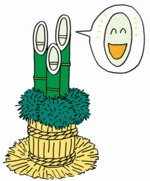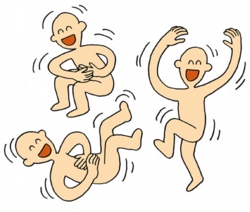What do you think of what “門 kado” mean? In general, as the proverb means that good fortune and happiness will come to the home of those who smile, “門 kado” is supposed to mean the “family / home”. However is it true….?
No, it actually means “門松 kadomatsu (the New Year's decorative bamboo poles object in Japan)"
Many people may say that is it true but why……? I’m going to explain this next.

First of all, why does fortune come when we laugh? I’m going to explain a little about the effective of “laughter”.
Have you heard that laughter heals sickness? Interestingly, when we laugh, the pain can be reduced and it can be maintained. This is because natural healing ability is promoted by laughing. Also, the effect of laughter has been medically demonstrated as the immune strength is increased and the natural killer cell (NK) is activated to kill cancer cells and so on.
Something good happening by laughing, isn’t it……….?
Well, let’s get back to the story about the “門松 kadomatsu (the New Year's decorative bamboo poles object in Japan)". Have you looked at it closely? As it’s shown in the picture above, don’t the cut edges look like a smiling mouth (口)?

The word for laughing “笑う” is composed with “竹 (bamboo)” and “天 (sky)”. The bamboo grows straight up to the sky. So such a straight forward mind (laughing) may get rid of the pain and suffering…When people laugh heartily, they don’t worry about this and that. When this happens, I wonder, if our natural healing power that has been forgotten comes back again…

As for “medicine (薬)” for sickness, this word is composed with “艹 kusakanmuri” and “楽 (enjoyment)” When people enjoy things, they laugh. As for the placebo (make-believe medicine) which is often used in the clinical situation, the word is derived from Latin language and means “gratification”. This is also related to laughter, too. Laughter can help to get rid of (消す) the sickness and suffering, I think.
What is the common thing among “laughter (笑)” , “bamboo (松)” and “getting rid of (消す)”? It’s all pronounced as “shō”. People of days gone by made these words to be kakekotoba (pivot words), which is a rhetorical device used in the Japanese poetic form waka, for good luck.

Also, those three bamboo poles used in the kadomatsu (門松) represent “sky, human and earth” It means that sky (nature) laughs, earth (nature) laughs and then humans as well laugh. They all break into fits of laughter. The “Nature (ecology)” brings us “fortune (福)” after all of the laughter. Laughter exactly relates to the ecology….. In short, what it means is that everyone can be happy….doesn’t it?
For a little more information, January, the beginning of a year, is “正月shō-gatsu”, so it’s also written with “笑月shō-gatsu” or “消月shō-gatsu” which means that we celebrate a new year by laughing and getting rid of all the bad things that happened last year.

